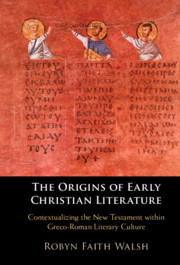 The Origins of Early Christian Literature
The Origins of Early Christian Literature Specialization and Social Formations
Published online by Cambridge University Press: 23 January 2021
Chapter 3 reviews what we know about ancient literary and literate practices and what some scholars term “book culture.” Using testimony from Greek and Latin writers, this chapter provides a concrete description of how one was trained to read and write in the ancient Mediterranean world and how literacy was attained. The theorizations of Pierre Bourdieu on habitus and fields helps articulate how a Greco-Roman writer could possess and represent a number of different interests, social influences, and skill sets, and how we might more fruitfully describe this kind of knowledge in our scholarship. Philo of Alexandria serves as a case study for this new approach as a writer interested in a number of overlapping subjects, including religion, philosophy, politics, and texts.
To save this book to your Kindle, first ensure [email protected] is added to your Approved Personal Document E-mail List under your Personal Document Settings on the Manage Your Content and Devices page of your Amazon account. Then enter the ‘name’ part of your Kindle email address below. Find out more about saving to your Kindle.
Note you can select to save to either the @free.kindle.com or @kindle.com variations. ‘@free.kindle.com’ emails are free but can only be saved to your device when it is connected to wi-fi. ‘@kindle.com’ emails can be delivered even when you are not connected to wi-fi, but note that service fees apply.
Find out more about the Kindle Personal Document Service.
To save content items to your account, please confirm that you agree to abide by our usage policies. If this is the first time you use this feature, you will be asked to authorise Cambridge Core to connect with your account. Find out more about saving content to Dropbox.
To save content items to your account, please confirm that you agree to abide by our usage policies. If this is the first time you use this feature, you will be asked to authorise Cambridge Core to connect with your account. Find out more about saving content to Google Drive.